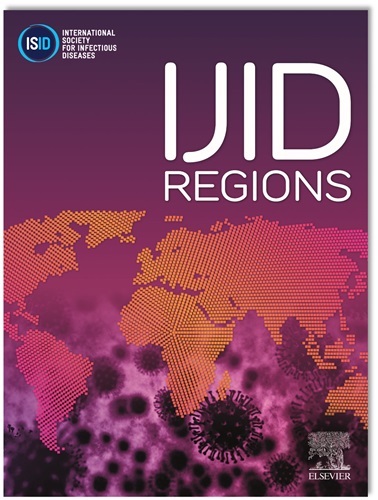Outcomes of adjunctive eravacycline for severe and fulminant Clostridioides difficile infection
IF 4.8
2区 医学
Q1 INFECTIOUS DISEASES
引用次数: 0
Abstract
Objectives
To characterize eravacycline (ERV) treatment for severe or fulminant Clostridioides difficile infection (CDI) and describe patient outcomes.
Methods
This was an institutional review board–approved, cross-sectional study of hospitalized adult patients with CDI who received adjunctive ERV with standard-of-care antibiotics for CDI from January 2019 to December 2023 at a five-hospital health system. Patients were included if they received ERV with standard-of-care antibiotics for ≥24 hours for severe or fulminant CDI. Patients with a history colectomy or with non-CDI ERV indications were excluded. The primary outcome was the proportion of patients that required colectomy due to C. difficile; secondary outcome was all-cause mortality at 30 days.
Results
Seventy-five patients were included: 25 (33%) had severe and 50 (67%) fulminant CDI and 23 (31%) had refractory severe/fulminant CDI. Patients receiving ERV were frequently immunocompromised (30, 40%) and required treatment in an intensive care unit (46, 61%). Eleven (14.7%) patients required colectomy within 30 days of adjunctive ERV; 28 (37%) patients died at 30-days.
Conclusions
ERV may be useful as a potential adjunctive therapy for severe or fulminant CDI. Patients receiving ERV often were immunocompromised and had fulminant disease with critical illness. Future comparative studies are needed to evaluate the impact of adjunctive ERV for CDI.
艰难梭状芽孢杆菌重症和暴发性感染辅助用药依拉维辛的疗效。
目的描述埃拉伐环素(ERV)治疗重症或暴发性艰难梭菌感染(CDI)的特点,并描述患者的预后:这是一项经 IRB 批准的横断面研究,研究对象是 2019 年 1 月至 2023 年 12 月期间在一家 5 家医院的医疗系统中接受 ERV 与标准护理抗生素 (SOC) 辅助治疗的 CDI 住院成人患者。如果患者因重症或暴发性 CDI 而接受 ERV 与 SOC 联合治疗的时间≥24 小时,则将其纳入研究范围。排除了既往有结肠切除术史或非 CDI ERV 适应症的患者。主要结果是因艰难梭菌而需要进行结肠切除术的患者比例。次要结果包括ERV辅助治疗时间、ERV治疗持续时间和院内死亡率:共纳入 75 例患者,其中 25 例(33%)为重症 CDI,50 例(67%)为暴发性 CDI;23 例(31%)为难治性重症/暴发性 CDI。11例(14.7%)患者在辅助ERV治疗后30天内需要进行结肠切除术。接受ERV治疗的患者大多免疫力低下,病情危重:结论:ERV可作为重症或暴发性CDI的潜在辅助疗法。接受ERV治疗的患者通常免疫力低下,病情危重。未来需要进行比较研究,以评估ERV辅助治疗CDI的效果。
本文章由计算机程序翻译,如有差异,请以英文原文为准。
求助全文
约1分钟内获得全文
求助全文
来源期刊
CiteScore
18.90
自引率
2.40%
发文量
1020
审稿时长
30 days
期刊介绍:
International Journal of Infectious Diseases (IJID)
Publisher: International Society for Infectious Diseases
Publication Frequency: Monthly
Type: Peer-reviewed, Open Access
Scope:
Publishes original clinical and laboratory-based research.
Reports clinical trials, reviews, and some case reports.
Focuses on epidemiology, clinical diagnosis, treatment, and control of infectious diseases.
Emphasizes diseases common in under-resourced countries.

 求助内容:
求助内容: 应助结果提醒方式:
应助结果提醒方式:


